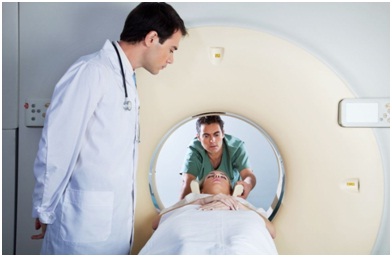
How an Experimental Treatment Could Revolutionize Radiation Therapy
Non-small cell lung cancer refers to any type of cancer that affects the epithelial tissue in the lungs, other than small cell lung cancer. It is the most common type of lung cancer, accounting for about 85 percent of all lung cancers in the U.S. Subtypes of non-small cell lung cancer include adenocarcinoma, squamous cell carcinoma and large cell carcinoma, but there are several other less common subtypes of non-small cell lung cancer.
Radiation therapy is the most effective treatment for non-small cell lung cancer. The best lung cancer treatments for patients suffering from non-small cell lung cancer combine radiation treatment with chemotherapy; this is especially beneficial for patients in more advanced stages of the disease. Researchers working with the Translational Genomics Research Institute (TGen) have identified a protein, Mcl-1, that may function to help non-small cell lung cancer cells resist radiation and drug therapies. The researchers have found a way to deactivate the protein, which could make radiation treatment more effective for non-small cell lung cancer.
How Non-Small Cell Lung Cancer Is Treated
If non-small cell lung cancer is diagnosed in its early stages, surgery may be the best option for treatment. Surgery can involve removing an entire lung or part of a lung. The healthier your lungs, the more lung tissue you can have removed; surgeons will generally try to remove as much tissue as possible to offer the best chance of a full recovery. Lymph nodes are also removed; this is to check for signs that the cancer has spread.
If surgery is not an option, radiation therapy is used to kill the cancerous tissue. Newer, better radiation therapy techniques allow doctors to target the cancerous tissue more accurately. Targeted radiation therapy leaves more healthy tissue undamaged, so patients experience fewer side effects and enjoy a better prognosis.
How Treatment Could Soon Change
In a study published in the journal Molecular Cancer Research, researchers from TGen have unravelled the role that the protein Mcl-1 plays in helping non-small cell lung cancer withstand radiation therapy and chemotherapy drugs. Previous research from TGen has established a link between over-activation of the cellular-signalling mechanism known as TWEAK-Fn14 and the survival of non-small cell lung cancer cells, even in spite of radiation therapy. This survival mechanism of the tumor cells relies on the expression of the Mcl-1 protein, the researchers have discovered.
Lead study author Dr. Timothy Whitsett told Science Newsline, “By deactivating Mcl-1, we believe we can give these lung cancer patients a better response to standard therapy.”
TGen researchers were able to deactivate the expression of Mcl-1 using a drug, known as EU-5148, which is produced by Eutropics Pharmaceuticals in Cambridge, Mass. By blocking the expression of Mcl-1, the researchers found they could stop the TWEAK-Fn14 cellular-signalling mechanism that allows non-small cell lung cancer cells to sometimes resist radiation therapy.
Senior study author and Associate Professor in TGen’s Cancer and Cell Biology Division, Dr. Nhan Tran, told Science Newsline, “This work positions both the TWEAK-Fn14 cellular pathway and the Mcl-1 protein as potential therapeutic interventions. Our evidence shows that, if we can bypass these mechanisms, it will be more difficult for these lung cancer cells to evade therapies.”
The researchers plan to conduct further studies into the relationship of Mcl-1 and the TWEAK-Fn14 cellular-signalling mechanism. They hope their research will eventually lead to clinical trials for medications, leading to more effective treatments for lung cancer patients.
The results of this study are promising because lung cancer is one of the most difficult cancers to treat. Symptoms often don’t appear until the disease has reached its later stages. Treatment resistance is a major obstacle to effective treatment of later-stage lung cancers.
Non-small cell lung cancer is the most common form of lung cancer. Like small cell lung cancer, it can be hard to treat, mostly because its symptoms may not appear while the disease is in its early stages. Radiation therapy is considered one of the best treatments for non-small cell lung cancer. In some patients though, treatment may fail to kill all of the cancerous cells. Researchers with TGen have identified the mechanism by which this occurs and are working on developing a drug therapy that could block the mechanism that lung cancer cells use to evade treatment. If they are successful, the drug could revolutionize radiation therapy for lung cancer and save thousands of lives annually.

